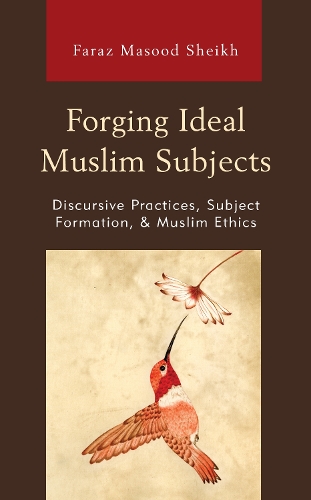
Forging Ideal Muslim Subjects: Discursive Practices, Subject Formation, & Muslim Ethics
(Paperback)
Available Formats
Publishing Details
Forging Ideal Muslim Subjects: Discursive Practices, Subject Formation, & Muslim Ethics
By (Author) Faraz Masood Sheikh
Bloomsbury Publishing PLC
Lexington Books
20th May 2022
United States
Classifications
Professional and Scholarly
Non Fiction
Theology
297.5
Physical Properties
Paperback
198
Width 154mm, Height 219mm, Spine 14mm
308g
Description
What forms can a religiously informed, ethical Muslim life take This book presents two important accounts of ideal Muslim subjectivity, one by 9th century moral pedagogue, al-Harith al-Muhasibi (d. 857) and the other by 20th century Kurdish Quran scholar, Said Nursi (d. 1960). It reconstructs Muhasibis and Nursis accounts of ideal Muslim consciousness and analyzes the discursive practices implicated in its formation and expression. The book discusses the range of psychic states and ethical relations that Muhasibi and Nursi consider critical for living an authentically Muslim life. It highlights the importance of discursive practices in Muslim religious and moral self-production. The author draws on Foucault's insights about ethics and practices of self-care to examine familiar Muslim discourses in ways that enrich contemporary conversations about identity, individuality, community, authority, moral agency and virtue in the fields of religious studies, Islamic studies and Muslim ethics. The book deepens our understanding of the fluidity and fragility of both the more familiar, obligation-centered ethics in Islamic thought and the less familiar, belief-centered modes of religio-moral being.
Reviews
Sheikh's work includes a dissertation on ninth-century Arab Muslim thinker and moral teacher al-Harith, born Asad al-Muhasibi. Sheikh (William and Mary) has also presented at conferences and written journal articlesevidence of his significant scholarship in religious ethics. In the present book, Sheikh applies what is appropriately termed a third wave interpretation in comparative religious ethics. He adds to his previous writings by integrating a close reading of 20th-century Kurdish Muslim Qur'anic scholar Said Nursi (18781960) with work of French philosopher Pierre Hadot and with late-career, postIranian revolution writings of Michel Foucault. The introduction, Narrating Ideal Muslim Subjectivities in a Foucauldian Register," provides a succinct orientation to the project. Four substantive chapterstwo on Muhasibi and two on Nursibring received Muslim categories into a more general discussion that includes the formation of moral subjectivity, sincerity, and self-care practice central to the work of Hadot and Foucault. The result is a serious, consequential analysis that can show new ways to appreciate long-established practices and methods for Muslim moral formation. Extensive references, bibliography, and index. Summing Up: Recommended. Upper-division undergraduates through faculty.
* Choice *Faraz M. Sheikhs engrossing study, framed through a comparative religious ethics lens, gifts its readers with insightful views into the religio-moral ideals of two prominent Muslim sages, the ninth-century pietist Muhasibi and the early twentieth-century thinker Said Nursi. The work is not only an invaluable contribution to the study of Muslim ethics, but also for the field of religious ethics more broadly. -- Martin Nguyen, Fairfield University
Textually layered, theoretically vivacious, and historically grounded, Forging Ideal Muslim Subjects marks a major intervention in the study of Muslim ethics and moral philosophy. How have Muslim thinkers wrestled with the foundational question of what constitutes a normatively good life and subjectivity Faraz Sheikh examines this question, combining brilliance with deep reflection, through an unprecedented exploration of the religious thought and career of two major though less explored scholars from the 9th and 20th centuries: al-Harith al-Muhasibi (d.856) and Said Nursi (d.1960). Faraz successfully demonstrates that while distinctive and separated by many centuries, these thinkers present us with particularly effective examples of the enduring yet variegated significance of moral discipline and subjectivity in Muslim thought and practice. This book should and will be widely read and debated.
-- SherAli Tareen, Franklin and Marshall College, author of Defending Muhammad in ModernityLiving in the modern world demands subservience to the gods of materialism, tribalism, and efficiency. How may one escape this iron cage Faraz Sheikh investigates the writings of al-Harith al-Muhasibi and Said Nursi to find out and discovers that these two thinkers have plenty to say. Both thinkers drew exquisitely detailed portraits of the ideal subjectivity and wrote incisively about how one may fashion it. This beautifully written book is an exemplary constructive and conceptual contribution to the field of religious ethics that puts Islamic thought in dialogue with ethicists concerned with secularism, pluralism, and the place of religion in the modern world.
-- Mairaj Syed, University of California, DavisAuthor Bio
Faraz Masood Sheikh is assistant professor of religious ethics in the Department of Religious Studies at William & Mary.
